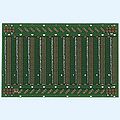(→Pictures) |
|||
| (2 intermediate revisions by one other user not shown) | |||
| Line 2: | Line 2: | ||
The plain PCB, or the fully assembled board were available via mail-order. Unlike as for the other DIY projects of the Schneiderware series, the PCB layout has not been printed (in paper-form) in the magazine (though the magazine offered to send them to interested persons). Another solution would have been to buy a standard ECB backplane (like [[:File:Reichelt Euro-Bus-Karte.jpg|this]]), and to build an adaptor for the CPC expansion port by hand. | The plain PCB, or the fully assembled board were available via mail-order. Unlike as for the other DIY projects of the Schneiderware series, the PCB layout has not been printed (in paper-form) in the magazine (though the magazine offered to send them to interested persons). Another solution would have been to buy a standard ECB backplane (like [[:File:Reichelt Euro-Bus-Karte.jpg|this]]), and to build an adaptor for the CPC expansion port by hand. | ||
| − | |||
| − | |||
| − | |||
== Pictures == | == Pictures == | ||
| Line 14: | Line 11: | ||
File:Reichelt Euro-Bus-Karte.jpg|Reichelt Euro-Bus-Karte (alternate solution) | File:Reichelt Euro-Bus-Karte.jpg|Reichelt Euro-Bus-Karte (alternate solution) | ||
</gallery> | </gallery> | ||
| + | |||
| + | == Scanned Article == | ||
| + | |||
| + | * [[Media:Schneiderware 2 - Backplane and Centronics.pdf|Schneiderware 2 - Backplane and Centronics.pdf]] - Basisplatine and Printer Port - '''7/1986 page 60-67''', plus complaints from 10/1986 page 10, port B redefined on 12/1986 page 124 and 3/1987 page 8-9, final notes from 11/1987 page 98 | ||
| + | |||
| + | == References == | ||
| + | |||
| + | * [[ECB Bus]] | ||
| + | |||
| + | [[Category:Peripherals]] | ||
Latest revision as of 02:18, 29 August 2014
The Schneiderware Basisplatine (backplane) is some kind of a ECB Bus motherboard for the Schneiderware DIY series, which was published by german magazine CPC Schneider International. The board has five 64-pin ECB sockets (for use with the DIY boards of the series), a 50-pin connector (for the CPC expansion port), and 7 soldering points (for an optional power supply, like the Schneiderware Power Supply).
The plain PCB, or the fully assembled board were available via mail-order. Unlike as for the other DIY projects of the Schneiderware series, the PCB layout has not been printed (in paper-form) in the magazine (though the magazine offered to send them to interested persons). Another solution would have been to buy a standard ECB backplane (like this), and to build an adaptor for the CPC expansion port by hand.
Pictures
Scanned Article
- Schneiderware 2 - Backplane and Centronics.pdf - Basisplatine and Printer Port - 7/1986 page 60-67, plus complaints from 10/1986 page 10, port B redefined on 12/1986 page 124 and 3/1987 page 8-9, final notes from 11/1987 page 98



